- Home
- Cherie Priest
Ganymede (Clockwork Century) Page 8
Ganymede (Clockwork Century) Read online
Page 8
Two men in work clothes, fresh from a shift at the pumps, came rushing down the walkway. They nodded at Andan and Briar, who nodded back—keeping the communication simple, for the language barrier was not insignificant. Many of the Chinatown residents and vault residents recognized one another on sight, but very few of them could share a conversation.
Ruby’s place was not so much a restaurant as a storefront stand with benches and tables, and no counter separated the eating area from the kitchen, where there were several fires heating strange round pans, filled with vegetables and fish, and chicken or pork when they could be found. It took ten minutes of careful enunciation and gesturing, plus a moment with a pencil on a piece of paper, but eventually the proprietor understood what they wanted.
Cly paid for both meals, then he and the sheriff sat on a bench outside to wait for their food. Together they watched the men come and go, some of them in coal-stained leather aprons from stoking the furnaces. Around their necks hung the goggles that protected their eyes from the white-hot fires that powered the air-bringing bellows.
“Hey, Wilkes,” he said, nudging her gently with his elbow. “I’ve been thinking.” He gazed down at her and felt very big and very silly. He knew the flush was back; he could feel it curling up his neck and around his ears. “It’s about these transports, and this … this next job, in particular.”
“For Yaozu.” She said the name quietly, lest it be heard over the sizzle of the cooking fires.
“I think he does want to improve the place. He’s a criminal and a mystery, and I don’t trust him. But at the end of the day, being crooked doesn’t make him any different from the rest of us down here. Not in any way that matters.”
Briar peered up at him. “Us down here?”
Cly cleared his throat again. “I was thinking maybe it’d be good to have a station out at Fort Decatur—an official station, not just a place where people drop by and park for an afternoon. With the kind of money he’s offering, I could do it,” he told her, leaving out the part about the extra money he’d pick up from the New Orleans summons. There was no reason for her to know about that. It’d only make her wonder about things that didn’t matter, and hadn’t mattered for years. “I could build a pipework dock without too much effort, and keep it as a home spot for the Naamah Darling, between supply runs and deliveries.
“Fang and Houjin spend plenty of time down here already, and my new engineer, Kirby Troost, probably won’t mind it. He’s a weird one—you haven’t met him yet, but I think he’ll work out fine, and maybe you’ll even come to like him. Anyway, it’s a lot of money, and all I have to do is head to New Orleans and pick up a few things.”
“New Orleans?” She sounded worried. “That’s where you’re off to tomorrow?”
“Yep. And in New Orleans, I can hit up one of the Texian machine shops and get the Naamah Darling refitted—or unfitted—so it’s better for moving real cargo instead of sap and gas.” He made that part especially clear, because he knew how well she’d like the sound of it. “While I’m there, I can pick up everything everybody needs, and a few other things besides. In particular, I was thinking…” He finished the rest in a rush: “Once it’s all sorted out, my ship and the Decatur dock, I could come back to Seattle and maybe I’d just … stay. And run the dock. Out at the fort. For good.”
At first she said nothing, her face unreadable. It always unnerved him when she made herself so blank like that. He prided himself on his ability to read people, and he wanted to read her—he needed to read her—but he had no idea if she was about to endorse the idea or call him an idiot.
“How would you, do you think … I’ve got to ask, Wilkes. How would you feel about that?”
She stood up, and she stepped in front of him—facing him almost eye-to-eye, since he remained seated. Her inscrutable expression cracked into confusion, surprise, and something sweeter. “Captain,” she said. “Would you be doing that for me?”
He swallowed hard, knowing that the uncontrollable blush was truly getting the best of him. “Yes, ma’am, I believe I would.”
“Are you sure it’s what you want? To make that kind of change? I didn’t even ask you to. Shit, Cly. I’m old, and I work too much, and I can’t remember the last time I wore a dress, and I run around in the dark with my daddy’s gun all day, and I … Are you sure?”
Without thinking, he slipped his hands around her waist, drawing her closer until her knees knocked against the bench. “I don’t care if you’ve never cooked a meal. I don’t care if you never wear a dress, and I’d be proud as hell to have a woman who can shoot as good as you. And as for old, well, I’m older than you. And I’m too big to walk down the street without people staring and pointing—and even if I wasn’t, I know I’m not much to look at. All I can tell you is, I’ve known ever since you stomped up to me on Bainbridge and demanded to hitch a ride.…” He did not know what to add. It was too hard, too dangerous to say out loud.
Gently, she took his face in her hands. She leaned forward until their foreheads touched, and he could feel the warmth of her breath against his cheek. She whispered, “You’ve known what, Captain Cly?”
“That I wanted a chance to prove I’m worth your trouble.”
* * *
Even when he was standing at street level on Seattle’s topside, Andan Cly still felt like he was underneath something. A long shadow covered much of the contained city, cast by the two-hundred-foot wall that surrounded it, and the sky above was gray like usual. Even at the very height of noon, any light that managed to make it past the shadow was filtered and dim. Direct sunlight, on those few days of the year when it appeared, was never quite brilliant within the wall, either. Every speck of illumination—from the sun, from the ever-present lanterns—was rendered thick and watery by years of accumulated blight gas, which filled the blocks with a thick, yellowish fog.
Watery, yes. That was it.
It felt like being underwater.
The gas mask he wore underscored this impression. The lenses rounded off the edges of his vision, creating a very slight fishbowl effect, and the charcoal filters through which he breathed made the air feel stuffy and taste strange. He didn’t like to hear the sound of his lungs working, and even the faintest whisper of a stuffy nose reached his ears as a hearty whistle. The straps were rubbing a groove into the back of his head, and the rubber seals made his face itch.
But all in all, it was better than breathing the blight. A few thousand of the walking dead would have attested to it, if they could.
Most of the ships that came or went from the city did so over at King Street Station, half a mile away. Decatur was more often considered a pit stop of last resort or desperate straits.
But Andan Cly saw potential.
He saw a sturdy protective barricade thirty feet high around the main compound, and a large shelter that could serve as a depot for goods and airmen and had an entrance to the underground through its basement. Conveniently located—almost triangulated—between Chinatown, the train station, and the vaults, it was within easy reach for the three main populations. All it needed was a framework of lead pipe sunk into the ground, so hydrogen ships would have something to dock against, rather than the present method of hitching down to an enormous fallen totem pole that grew softer and more rotten by the month.
Well, it’d also need a set of tanks for hydrogen manufacture and fill-ups, and some tubing to pump everything up. Cly had a feeling the tanks would be best positioned underground, since untreated metal corroded so quickly in the blight, and there was no telling how, or if, that pervasive gas would interfere with hydrogen production.
But he was getting ahead of himself.
It was difficult not to, when he thought about the possibilities. The underground could have a real, honest-to-God dock inside—where people could reliably send and receive goods and messages … maybe even mail! It’d make Seattle something like a real city again, despite the rotters and the toxic air. It’d mean easier access to
the outside for people who wanted it.
Cly put his hands on his hips and watched as the Naamah Darling prepared for takeoff. His ship was full of fuel and had hundreds of miles to go before it’d need a fill-up, but his crew members were checking the last-minute details, running down the list of things that needed attention before a cross-country excursion.
Hydrogen stores: check.
Thrusters and hydraulics in good repair: check.
Cargo hold emptied, cleaned, and ready for stocking: check—though in this case it was emptied, cleaned, and ready for the retrofitting in New Orleans. This meant all the gas bags had been dumped, and the bracing crates had been removed. The long ceiling rails with their ball-bearing rollers would be cut off at a machine shop, and the resulting seams would be soldered. Rubber seals needed to be restored and augmented if he was going to carry cargo that he didn’t want tainted by the city air.
“Hey, boss, we’re about ready to fly,” reported Kirby Troost, the Naamah Darling’s new engineer. Troost was a little man, roughly the height of Briar Wilkes and maybe ten pounds heavier. But what he lacked in size, he made up for with a keen intelligence and a willingness to try anything once. He was fresh out of jail. What he’d done to land there, he wasn’t fond of saying.
Cly knew, but he didn’t spread it around. The secret protected them both.
The captain nodded down at the engineer and looked back at the log structure that led to the underground, courtesy of a pair of ladders. “Before we go, I want to make sure nobody has any ‘one last things’ to ask for.”
Kirby Troost bobbed his head. The bob looked heavy, as if his gas mask threw off his balance.
“You doing all right in that thing?” Cly asked, indicating the mask.
“Yes, sir. No trouble at all.”
“Really? Because mine itches like a son of a bitch.”
“Didn’t say it was pleasant, sir. Just said it wasn’t any trouble.”
“If it bugs you, they’ve got a bunch of different models you could try. On the return trip, I’ll take you to the storage center in the vaults, and you can try ’em on one after another, like they’re hats in a shop.” Seeing Mercy Lynch coming toward him, he called out, “Mercy! You think of something else?”
She said, “Yep, and I’m glad you’re still here. I was afraid you’d already left.” She wiggled her hand in a gimme motion.
“Oh, your list. It’s right here.” He removed three of them from his pocket, selected hers, and gave it back to her.
“Thanks. I’ll be right back. Since it doesn’t look like I’m holding you up, or anything.”
“No, ma’am. Take your time.”
Kirby stood beside the captain, watching Mercy retreat to the station house—or the building that would become a station house if Cly had anything to say about it. The engineer said, “Fine figure of a woman, there.”
“How can you tell? She’s wearing a mask.”
“Not talking about her face, sir. She looks strong. I like that.”
“You like them taller than you?”
“If I stuck to the ones who were shorter than me, I’d never have any fun at all.”
Cly shrugged. “She’s young. But not so young that people would talk.”
“Are you saying I should have a word with her?”
“I’m saying if you did, it wouldn’t be a scandal. But there are two things you should know first.”
“I’ll start counting.”
“First,” said the captain. “She’s been married before.”
“Widowed?”
“Her husband died in the war.”
“And what’s number two?” Troost asked.
“Number two is her father. If you decide to have a word with her, you’d best do it while he’s still on crutches.”
“Is he a big man?”
“Yup.”
Kirby Troost said, “Good. They’re the easiest kind to outrun.” And then, as Yaozu strolled into the compound area he added, “Men like that one, on the other hand…”
As was so often the case, the lord and master of King Street Station was dressed in white except for his shoes—making him easy to recognize, even in a mask that obscured his face. He moved ghostlike through the foggy gas, which thickened and thinned in clumps around him, parting for his passage.
“Captain Cly,” he said. “I trust Houjin gave you my requests?”
“Got ’em right here,” he said, patting the vest pocket where all his lists went. “Some of this will take some looking for, but I’ll scare it up.”
“Of that I have no doubt. But there’s still the matter of how you’ll pay for it. I’m certain your credit is good from coast to coast, but money speaks louder than reputation, and some of my requests are expensive.” After reaching into the folds of his long pale jacket, he extracted a pouch. “This should cover everything, with some to spare. And you’ll find the second half of your fee when you return. Now, at the risk of making a sudden shift in conversation, is this your new crewman? I understand that Rodimer died last year.”
“That’s right.” Cly answered both questions at once. “This is my new engineer,” he said, indicating Troost.
“You seem … very familiar to me,” Yaozu said, squinting through his visor at the smaller man, who squinted back through his own.
Troost said, “Can’t say we’ve ever met. It’s hard to tell with these masks.”
“You’re right, of course. Still, there’s something about you. Whatever it is, it reminds me of someone I met years ago, in a desert town called Reno.”
“Never been there.”
“Never once? Are you certain?”
“Well,” the engineer said. His tone oozed contrived carelessness. “Since you’ve asked me to reconsider, I’ll have to think on it. I’ve done a lot of traveling in my time.”
Yaozu said, “It’s possible I’m mistaken. At any rate—” He held out the pouch to the captain.
Cly took it and stuffed it into the pocket with his lists. It made a heavy bulge against his chest, but he was layered up against the blight, and it did not show through his clothes. “I appreciate the vote of confidence.”
“And I’ll appreciate receiving everything I’ve asked for. Make no mistake, this is a vote of confidence.”
“I’ll be back in one piece, with all your goodies.”
“Oh, I know you’ll be back,” Yaozu said, glancing over his shoulder. “I can count on the fact that you’re too smart to come back empty-handed.”
“Thanks,” Cly said, ignoring the unsavory implications—not because he doubted Yaozu’s sincerity or capacity to be unpleasant, but because he had no intention of letting him down. He’d be back, and they both knew it.
Briar arrived, emerging from the station house with Mercy, who had finished making her revisions. The nurse gave her list to the captain, and she told him, “It’s no small thing, you doing this. They trust you around here, don’t they?”
“I hope so,” he replied.
In his other vest pocket, he had an envelope of money from Lucy O’Gunning, gathered from the patrons at Maynard’s, and to that envelope, he’d added Mercy’s contribution—gleaned from Dr. Wong’s patients, and those she’d helped to patch up in the months since she’d arrived.
Briar made a point to stand away from Yaozu. She couldn’t ignore him, but she didn’t have to like him, and she felt no compunction to be friendly. She told Mercy, “Cly’s good for it. And you must be the new fellow, Kirby Troost.”
“Yes, ma’am, and you’re the lady sheriff I’ve heard so much about. I do hope you’ll pardon me if I don’t remove my mask.”
“Why on earth would you remove your mask?”
“I’m not wearing a hat, and it only seems polite to remove something when meeting a lady.”
She laughed and said, “At least you didn’t offer to take off anything else. Where’d you find this one, Captain?”
“Tacoma. I’ve known him for ages, but don’t believe everyth
ing he tells you. I like him better than I trust him.” He said it as if it were a joke, carefully devoid of weight. Then he added, “Anyway, I was starting to wonder if you were going to make it.”
“And let you leave without seeing you off? Not a chance. Is everything ready? You’ve got everything you need, and everything’s working all right? I hope you’ve tested everything, and double-checked everything, and—”
“All of it, and some of it twice,” he assured her.
From within her mask her voice was muffled, but he could still hear the worry when she said, “I don’t mean to nag you like you don’t know what you’re doing. It’s just that New Orleans is an awful long way away.”
“You gonna worry about me?”
She admitted, “More than I’d like to. Three weeks?”
“Three weeks,” he promised. “And if I’m running any longer than that, I’ll send word by telegram. Tell Princess Angeline to keep her eyes open at the Tacoma taps, or get a friend to check it. She’s got friends all over the place, anyway. I swear to God, that woman knows half of everyone on the coast.”
“Just about,” Briar agreed. “I’ll flag her down next time she passes through.”
Underneath the Naamah Darling, the retracting steps quivered as Houjin descended. The seventeen-year-old Chinese boy was accompanied by fellow Mandarin Fang, who had served as Captain Cly’s first mate for over a decade. Both were wearing long sleeves, long pants, duster coats, and gas masks, lest the blight cause itching rashes on whatever parts were exposed.
Houjin cried, “Hey! Are we going to hit the skies, or hang around here all day?”
Fang said nothing, because he had no tongue. But his posture echoed the question, feet apart, arms folded, head cocked to the side.

 Maplecroft
Maplecroft Chapelwood
Chapelwood Fathom
Fathom Hellbent
Hellbent Jacaranda
Jacaranda Four and Twenty Blackbirds
Four and Twenty Blackbirds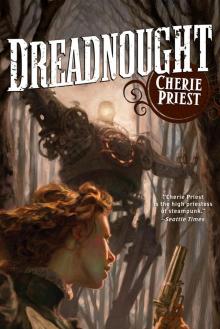 Dreadnought
Dreadnought Dreadful Skin
Dreadful Skin Bloodshot
Bloodshot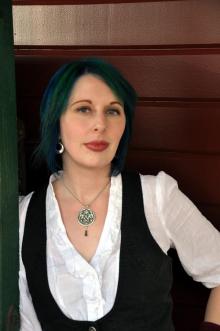 Tanglefoot
Tanglefoot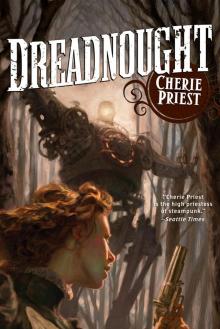 Clementine
Clementine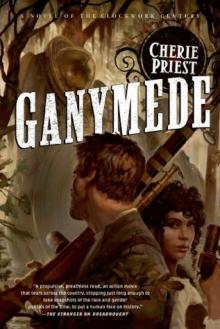 Ganymede
Ganymede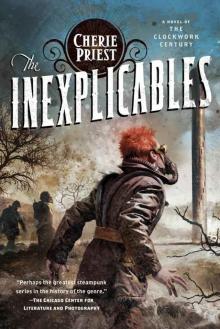 The Inexplicables
The Inexplicables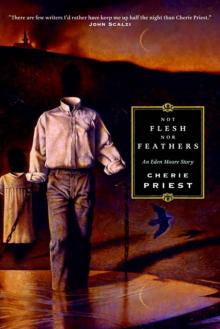 Not Flesh Nor Feathers
Not Flesh Nor Feathers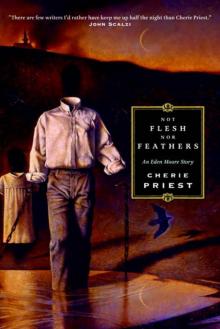 Wings to the Kingdom
Wings to the Kingdom Fiddlehead
Fiddlehead Tanglefoot: A Story of the Clockwork Century
Tanglefoot: A Story of the Clockwork Century The Agony House
The Agony House Ganymede (Clockwork Century)
Ganymede (Clockwork Century) The Inexplicables (Clockwork Century)
The Inexplicables (Clockwork Century)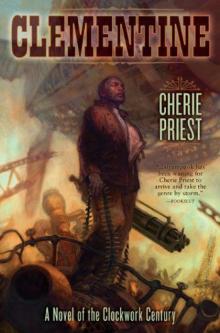 Clementine tcc-2
Clementine tcc-2 Grants Pass
Grants Pass Dreadnought tcc-3
Dreadnought tcc-3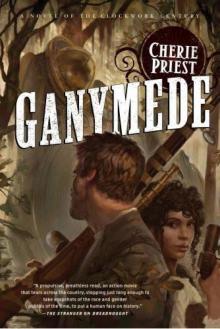 Ganymede tcc-4
Ganymede tcc-4